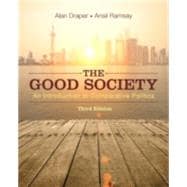NOTE: You are purchasing a standalone product; MyPoliSciLab® does not come packaged with this content. If you would like to purchase both the physical text and MyPoliSciLab search for 0134113934 / 9780134113937 The Good Society: An Introduction to Comparative Politics plus MyPoliSciLab for Comparative Politics – Access Card Package, 3/e, which includes:
- 0133974855 / 9780133974850 The Good Society: An Introduction to Comparative Politics, 3/e
- 0134064054 / 9780134064055 MyPoliSciLab for Comparative Politics Access Card
MyPoliSciLab should only be purchased when required by an instructor.
For courses in Introduction to Comparative Politics
Examine the Elements of a “Good Society”
The Good Society: An Introduction to Comparative Politics takes a comprehensive look at the question: Why are some governments better than others? Exploring issues related to why certain political institutions provide a better quality of life for their citizens, readers can learn not only how different political systems work, but how they can work better. Redefining the common case-study and thematic approaches used in other courses on the subject, The Good Society approaches comparative politics in a relevant and meaningful way that helps readers understand the way different governments function.
Also available with MyPoliSciLab
MyPoliSciLab for Comparative Politics courses extends learning online, engaging students and improving results. Media resources with assignments bring concepts to life, and offer students opportunities to practice applying what they’ve learned. And the Writing Space helps educators develop and assess concept mastery and critical thinking through writing, quickly and easily. Please note: this version of MyPoliSciLab does not include an eText.
The Good Society: An Introduction to Comparative Politics, Third Edition is also available via REVEL™, an immersive learning experience designed for the way today's students read, think, and learn.








